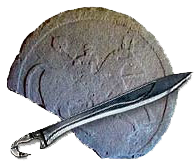Autor: Hannon
miércoles, 04 de octubre de 2006
Sección: Opinión
Información publicada por: Hannon
Mostrado 22.310 veces.
...
-
No hay imágenes relacionadas.
Comentarios
 Pulsa este icono si opinas que la información está fuera de lugar, no tiene rigor o es de nulo interés.
Pulsa este icono si opinas que la información está fuera de lugar, no tiene rigor o es de nulo interés.
Tu único clic no la borarrá, pero contribuirá a que la sabiduría del grupo pueda funcionar correctamente.
Si te registras como usuario, podrás añadir comentarios a este artículo.

Teshub:
Antes de nada, Christ es un autor de reconocida solvencia y sus obras suelen aparecer en la mayor parte de las bibliografías a tener en cuenta. Que a esta obra le falten muchas cosas, es algo que seguramente se deba a los intereses comerciales, que se imponen generalmente a los deseos del autor, aunque esta obra fue anteriormente publicada en alemán, país donde se toman el asunto bastante más en serio.
Efectivamente Christ menciona la huída de Aníbal; que “En una cabalgata nocturna a marchas forzadas llegó a su finca de Tapsos, donde había un vehículo dispuesto para su huída (...)”.
Christ da a entender que la acusación se debió a sus detractores en el Senado cartaginés. Sin embargo, luego va narrando las diferentes etapas de la huída de Aníbal, en la que el estratega se convirtió en la auténtica pesadilla de los romanos, viajando allí donde veía perspectivas de intervención.
En cuanto a los textos sobre la huída de Aníbal a la corte de Antíoco, aquí te pongo algunos fragmentos de otros autores:
Cornelio Nepote; XXXIII, 7, 7:
“In the year after his praetorship, when Marcus Claudius and Lucius Furius were consuls, ambassadors from Rome came again to Carthage; and Hannibal, supposing that they were sent to demand that he should be delivered to the Romans, went secretly, before an audience of the senate was given them, on board a vessel, and fled into Syria to Antiochus. His departure being made public, the Carthaginians sent two ships to seize him, if they could overtake him. His property they confiscated; his house they razed to its foundations; and himself they declared an outlaw”.
También Cicerón dice que sus conciudanos lo desterraron:
Cicerón, Sest, 142:
“His own fellow-citizens banished him from the city; but we see that he, though our enemy, is celebrated in the writings and recollection of our citizens.”
Valerio Máximo dice lo siguiente (IV, 1, 6):
“Non defuit maioribus grata mens ad praemia superiori Africano exsolvenda, si quidem maxima eius merita paribus ornamentis decorare conati sunt. voluerunt illi statuas in comitio, in rostris, in curia, in ipsa denique Iovis optimi maximi cella ponere, voluerunt imaginem eius triumphali ornatu indutam Capitolinis puluinaribus adplicare, voluerunt ei continuum per omnes vitae annos consulatum perpetuamque dictaturam tribuere: quorum nihil sibi neque plebiscito dari neque senatus consulto decerni patiendo paene tantum se in recusandis honoribus gessit, quantum egerat in emerendis..
Eodem robore mentis causam Hannibalis in senatu protexit, cum eum cives sui missis legatis tamquam seditiones apud eos moventem accusarent. adiecit quoque non oportere patres conscriptos se rei publicae Karthaginiensium interponere altissimaque moderatione alterius saluti consuluit, alterius dignitati, victoria tenus utriusque hostem egisse contentus”.
Silio Itálico (que no da demasiadas pistas al respecto), en XIII, 875-885:
“No temas –exclamó la adivina-, la vida de este guerrero no seguirá siendo invulnerable. Sus huesos no descansarán en su patria. En efecto, cuando, agotados sus recursos, haya sufrido una derrota después de una gran batalla y haya implorado clemencia de manera vergonzosa, tratará de reanudar la guerra en el bando de los macedonios. Condenado por traición, deberá dejar a su fiel esposa y a su hijo y abandonará la ciudadela de Cartago (...)”
Apiano; Syr. IV<7B>:
“rumor having spread abroad that Ptolemy Philopator was dead, Antiochus hastened to Egypt in order to seize the country while bereft of a ruler. While on this journey Hannibal the Carthaginian met him at Ephesus. He was now a fugitive from his own country on account of the accusations of his enemies, who reported to the Romans that he was hostile to them, that he wanted to bring on a war, and that he could never enjoy peace. This was a time when the Carthaginians were leagued with the Romans by treaty”.
Eutropio; IV, 3:
“The Macedonian war being thus terminated, the Syrian war, against King Antiochus, succeeded, in the consulship of Publius Cornelius Scipio and Manius Acilius Glabrio, To this Antiochus Hannibal had joined himself, abandoning his native country, Carthage, to escape being delivered up to the Romans. Manius Acilius Glabrio fought successfully in Achaia. The camp of King Antiochus was taken by an attack in the night, and he himself obliged to flee. To Philip his son Demetrius was restored, for having assisted the Romans in their contest with Antiochus”.
Orosio; IV, 20, 13:
“tunc etiam Hannibal propter excitandi belli rumores, qui de eo apud Romanos serebantur, exhiberi Romam a senatu iussus, clam ex Africa profectus ad Antiochum migrauit: quem cum apud Ephesum inuenisset cunctantem, mox in bellum inpulit”.
Zonaras; IX, 18:
“Malicious reports about him were also conveyed to p307the Romans, to the effect that he was rousing the Carthaginians to revolt and was taking counsel with Antiochus. Learning now that some men from Rome were present, and fearing arrest, he fled from Carthage by night”.
Me falta un fragmento de Diodoro Sículo, que ahora mismo no puedo localizar.
En cuanto a Catón y sus afirmaciones, no era excesivamente amigo de Escipión, y al Africano, le salía mucho menos rentable defender a Aníbal que capturarle. Además, las medidas políticas que había llevado a cabo Aníbal, no fueron demasiado populares entre las clases pudientes cartaginesas, por lo que la historia de los senadores púnicos acudiendo a Roma para acusar a Aníbal parece bastante convincente.
Un saludo.
Hay 1 comentarios.
1